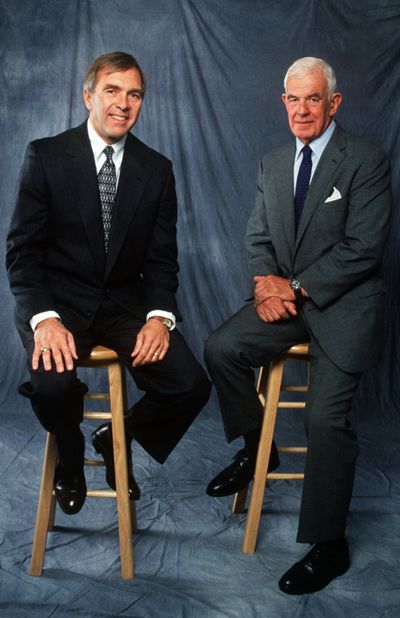This column reflects the opinion of the writer. Learn about the differences between a news story and an opinion column.
Spin Control: Former opponents Nethercutt and Foley linked in effort to improve civil discourse

There is an axiom in politics that nothing is permanent, so remember that today’s adversaries may be tomorrow’s allies.
So it was pleasantly surprising, but not shocking, that organizations tied to two people who engaged in one of the most spirited and storied political battles in Spokane history will be joining forces to improve civil discourse.
George Nethercutt will be joining the advisory board of the Thomas S. Foley Institute for Public Policy and Public Service at Washington State University, and his foundation will be providing an endowment for a lecture series with the institute.
For those who don’t remember – because it was 28 years ago – that’s the same George Nethercutt who, as a political novice, defeated then-Speaker of the House Tom Foley in 1994. It was a heated campaign with a record nine debates crammed into less than two months. It was also a local race with national implications, with a record amount spent by the candidates and outside groups.
For Republicans, it was a delicious victory. For Democrats, a stunning loss. The result was historic: No speaker of the House had lost a re-election bid since 1862.
Nethercutt went on to serve 10 years in the House, ran unsuccessfully for the Senate, and then returned to his earlier job as a lawyer. Foley served as U.S. ambassador to Japan, worked at a Washington, D.C., public affairs firm and served as an elder statesman of his party.
Both had a love for civil discourse and the ability to find compromise to tough problems they wanted to pass on through a legacy. For Foley, who died in 2013, it’s the institute at WSU, which holds his memorabilia, papers and records from 30 years in Congress and several more as ambassador. It supports research on public policy, brings nationally recognized speakers to events on and off the Pullman campus and supports student internships on public service.
The institute will soon premiere a documentary on Foley and his approach to politics. (Full disclosure: I helped the film production company, Avatar Studios, with some of the research and writing for the documentary.)
For Nethercutt, it’s the George Nethercutt Civics Foundation, which has sponsored tournaments where students compete on their knowledge of civics and internships for young people to travel to Washington, D.C., to see the workings of the federal government. He has also written two books, “In Tune With America: America in Song,” published in 2010, and the recently released “Saving Patriotism.”
The foundation will be endowing a speaker series on civil discourse and civics education through the institute. Once or twice a year, an advisory board will select a nationally recognized speaker on civics and government.
The idea was hatched about a year ago by David Condon, who was recruited for the institute’s board by Foley’s widow Heather during his second term as Spokane mayor. Condon knew Nethercutt and often had his foundation’s fellows spending a day in the mayor’s office to get an up-close view of city government.
He recognized that the institute and foundation have similar goals of advancing civic engagement, albeit at slightly different age levels. About a year ago he approached Nethercutt with an idea for the two organizations to join forces.
Nethercutt is suffering from a neurological disorder, progressive supranuclear palsy (PSP), that makes it increasingly difficult to speak and walk.
His son, Elliott Nethercutt, said the foundation has evolved over time, but the mission statement remained the same.
“The foundation did a lot of good, bringing people back to Washington and showing them how the federal government functions,” he said. But the foundation’s overhead was “tough to keep up” and partnering with the institute made sense because there is overlap between the two organizations. Both Foley and his father were dedicated to bipartisanship and compromise, he added.
“There’s so much polarization in politics that a program within the Foley Institute, with endowed lectures from all sides of the political spectrum will keep the dialog going,” Elliott Nethercutt said.
The institute’s advisory board will also double, from seven members to 14, with new members who will include – along with George Nethercutt – Bill Hyslop, former U.S. Attorney for Eastern Washington and former Spokane County GOP chairman; David Ammons, former Associated Press political writer and former Public Disclosure Commission chairman; and David Masten, vice president of public affairs for the Association of Washington Business and former state legislator.
Foley and Nethercutt did not remain adversaries after the ballots were counted in 1994, Heather Foley said. The long-term congressman invited his replacement to lunch in the House dining room after the election. He was following the example of his predecessor, Walt Horan, 30 years earlier.
They kept in touch, and in 2000, Nethercutt sponsored the legislation that renamed the federal courthouse in Spokane the Thomas S. Foley Courthouse, and the area outside the Walt Horan Plaza.
“He always believed, once the election was over, if you hold a grudge, it doesn’t make sense,” Heather Foley said of her late husband.